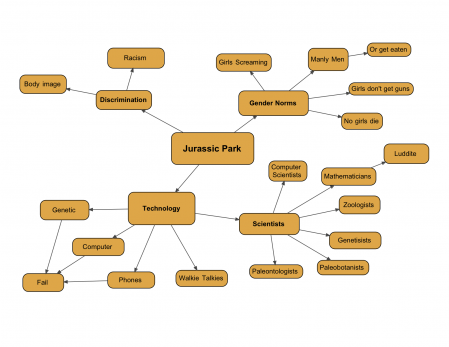
Well we watched Jurassic Park last night and concluded it with a discussion about the issues underlying the movie, the same way we’ve been studying analyzing the issues underlying texts. Discrimination based on race and obesity came up first (the fat guy and the black people “always” die), but I was able to coax a bit of discussion about the role and responsibility of science and scientists. Our discussion is summarized in the graphic organizer above, but there are many more subtexts to the story that we did not have time to explore.

I like both the movie and the book because, like most good science fiction, they explore some interesting issues that relate quite nicely to the curriculum. Jurassic Park has a nice little introduction to DNA and gene sequencing that is tied to some the history of life on Earth. As works of art in their respective fields, however, I prefer the movie. The novel has a lot of wonderful detail, and the scientist in me loves the detail, but the characters are not as well drawn and the story seldom strays from its main thesis, scientific hubris. What it has to say about that issue is well expressed and well researched so it does capture the interest of the reader. (The follow-up book, “The Lost World”, sails adrift of the science, is logically incoherent and has a proportionate deterioration in the quality of the writing.) I do however recommend the original Jurassic Park book to my students as a personal novel.
Steven Spielberg makes a great movie, extracting empathetic performances from the actors. Since the book’s author, Michael Crichton, also wrote the screenplay, the movie stays true to the core issues in the text. I think its a great example of a successful, dare I say synergistic, collaboration.
Tomorrow, instead of retelling around the issues in writing, my students are going to try to do so in a skit. This could get interesting.